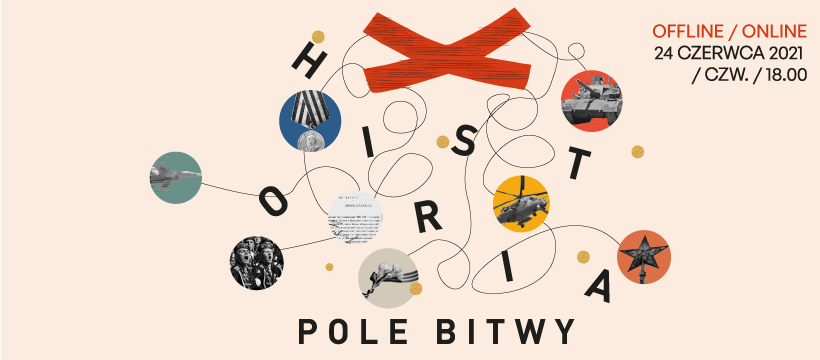History - a battlefield
- How does the Kremlin use history to achieve its current political goals?
- What are the main founding myths of Putin's Russia?
- What is the phenomenon of "second memory" in Russian society?

These and other questions will be answered by Centre for Eastern Studies analysts Maria Domańska and Jadwiga Rogoża and the director of the Centre for Polish-Russian Dialogue and Understanding Ernest Wyciszkiewicz. The discussion will be moderated by journalist Piotr Pogorzelski.
The cornerstone of Russian historical policy is the sanctification of victory in the Great Patriotic War as a key event in the country's history, constituting a kind of founding myth of the Putin era. The worship for this victory is based on propagating the idea of Russian messianism, suppressing or denying the dark pages of Soviet history and justifying Stalin's terror. The rightfulness of historical research is guaranteed by the repressive state apparatus and the provisions of the criminal code, while independent researchers are being increasingly persecuted.
Although the majority of citizens are susceptible to the Kremlin's historical narrative, a reverse process can be observed in the younger generations - an interest in disclosing the tragic pages of the country's past, in exploring the fate of not so much the empire but one's own region, city, family, in talking about the costs of building a superpower and of great victories. These activities became known as "second memory", in opposition to the heroic and state-centric "first memory".
In the context of Polish-Russian relations, it is also worth considering what Poles know about Russian propaganda actions in the field of history, what emotions they evoke in their minds and how they perceive the Polish response to them, as well as how the Kremlin's historical policy influences the perception of Poland in Russia.
Before the event, we encourage you to read the reports:
- Naprzód, w przeszłość! Rosyjska polityka historyczna w służbie „wiecznego” autorytaryzmu [Forward into the past! Russian historical policy in the service of "eternal" authoritarianism], download here (in Polish): https://bit.ly/3xpVjUq
- The Image Of Poland In Russia Through The Prism Of Historical Disputes, download here: https://bit.ly/3wMEHWP
- Information War – Propaganda About History, download here: https://bit.ly/3xEWnUi
GUESTS
Maria Domańska - an analyst at the Centre for Eastern Studies since May 2015, she researches internal politics in Russia. Former diplomat, from 2006 to 2015 she worked at the Ministry of Foreign Affairs, from 2012 to 2015 she headed the Political Section in the Embassy of Poland in Moscow.
Jadwiga Rogoża - analyst of the Russian Team, from 2015 to 2018 – counsellor in the Polish Embassy in Moscow, specializes in Russian political, social and cultural issues, author of, inter alia, Katyn. In the Footsteps of the Crime (together with Maciej Wyrwa) published by CPRDU in 2019.
Ernest Wyciszkiewicz - political scientist, director of the Centre for Polish-Russian Dialogue and Understanding since 2016. Formerly Deputy Director of the Centre, as well as Energy Security, Climate Change and International Law Program Coordinator at the Polish Institute of International Affairs. Author of numerous analytical studies, expert opinions and articles on energy policy of the Russian Federation and the European Union, European Union-Russia relations, foreign policy of the Russian Federation and international climate negotiations.
Piotr Pogorzelski - journalist of Belsat in Polish, author of the podcast "Po prostu Wschód" [Just the East].
offline
24 June 2021 (Thursday) at 18:00
Marzyciele i Rzemieślnicy
25 Bracka Street, Warsaw (3rd floor)
RSVP kolakowska@cprdip.pl
online
Facebook CPRDU and OSW (centre for Eastern Studies)
The meeting will be translated into Russian.
1. The number of places in the venue will be limited, first come first served basis at: kolakowska@cprdip.pl
2. During the meeting we provide participants with no more seats in the venue than allowed.
3. Please take your seats according to the signs, within the required distance.
4. Participation in the event is permitted as long as the mouth and nose are covered. Please take a protective mask with you.
5. Participants will be invited to enter the room no earlier than 15 minutes before the start of the event.
6. Participants will be asked to provide personal details (e-mail address or telephone number) so that we can contact them if SARS-CoV-2 infection is detected among the participants.
7. By coming to the meeting, participants declare that they are not in quarantine and that in the last 10 days they:
- have not been in countries with an increased coronavirus infection rate;
- have had no contact with persons confirmed to be infected with coronavirus;
- have not experienced symptoms of coronavirus infection (fever, cough, diarrhoea, shortness of breath, muscle and joint pain, etc.).
If you have any worrying health symptoms, please do not attend the event, stay at home and watch the online transmission.